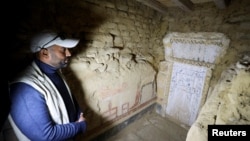An excavation team in Egypt has unearthed an ancient tomb containing a mummy believed to be 4,300 years old. It is among dozens of artifacts recently discovered.
After a year-long excavation, renowned archaeologist Zahi Hawass announced the findings at Gisr al-Mudir, also known as the Great Enclosure, one of the oldest known stone structures in Egypt. Among them – Khmumdjedef - a priest from the fifth dynasty, Meri, a palace official who held the title “keeper of the secrets,” and a man named Hekashepes.
“This mummy may be the oldest and most complete mummy found in Egypt to date," Hawass said about Hekashepes, in a statement. Other major discoveries from the excavation included statues, amulets, and a well-preserved sarcophagus.
“I put my head inside to see what was inside the sarcophagus: A beautiful mummy of a man completely covered in layers of gold,” said Hawass.
Over the past week, researchers have made many other discoveries, such as dozens of burial sites from the New Kingdom Era, which dates from 1800 to 1600 B.C., near the southern city of Luxor.
Additionally, a group of scientists from Cairo University announced details Tuesday about a previously uncovered mummified teenage boy. Through the use of CT scans, they were able to shed new light on the boy’s high social status by examining the intricate details of the amulets inserted in his mummified body as well as the type of burial he received.
The Egyptian tombs are a large tourist draw and the North African country often advertises them as a way to bring in more money. The number of visitors, however, has been negatively affected since an uprising in 2011, the coronavirus pandemic, and, most recently, the war in Ukraine.
Some information for this report came from The Associated Press and Reuters.









